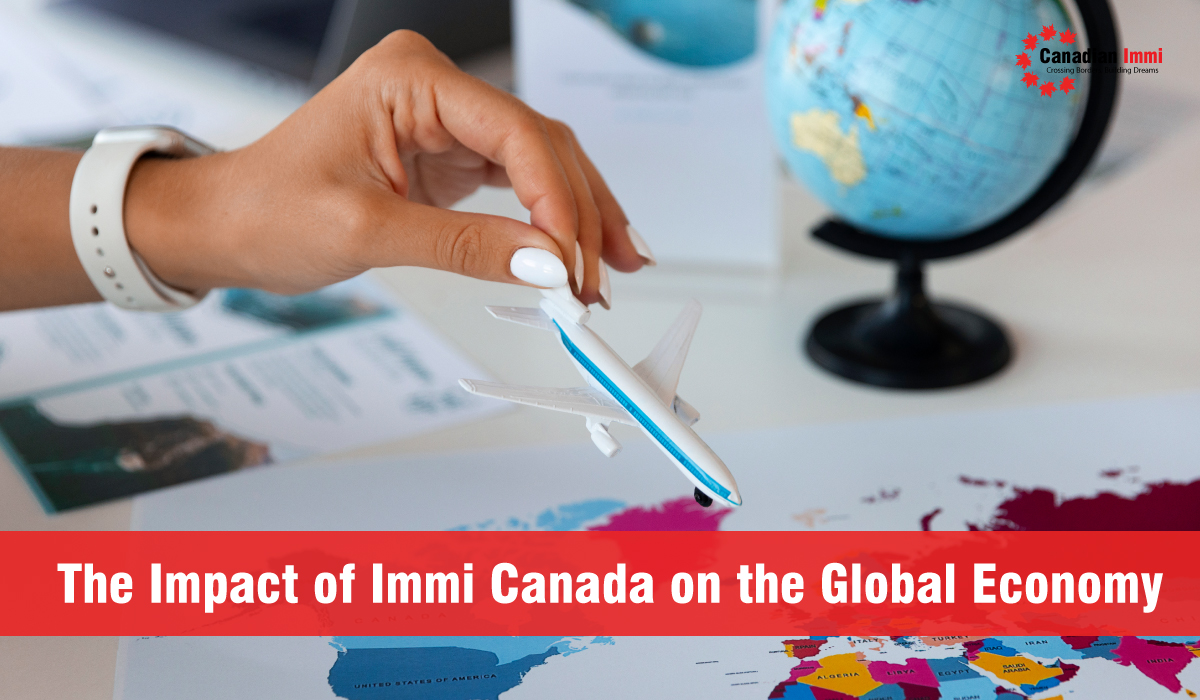Canada has in recent decades occupied a privileged position among the world’s immigrant-receiving countries. Immigration accounts for practically all of the country’s population growth, and about 85% of newcomers become citizens.
This is no small achievement, considering that some commentators claim immigrants have substantial negative impacts – stealing jobs and reducing wages. That view is at odds with a sizeable body of economic studies.
1. Canada is a global leader
Immigration has long played an essential role in Canada’s economy, providing a young stream of labor that helps to offset the country’s ageing population. However, with a growing number of countries offering more open and inclusive immigration policies, Canada’s competitiveness in the world of global talent recruitment is likely to become increasingly challenging. In particular, Canada will face new competition from rapidly developing economies like China, India, and Turkey that are seeking to re-position themselves as centers of innovation and science rather than traditional low-wage manufacturing countries.
Well-managed integration programming can ensure that the most talented international students, workers, and families choose to settle in Canada. This includes making sure that immigrants are welcomed into the societal mainstream with access to housing, jobs, and education. Moreover, well-managed integration programming can also help to ensure that immigrants make an immediate contribution to the economy by paying for healthcare, and through the remittances they send home.
Beyond these immediate contributions, immigrants have a much bigger impact on society at large. They can contribute to the creation of innovative products and services that improve people’s lives – for example, Javier Bravo, an immigrant from Mexico City, who set up a platform where users could gift certificates that were redeemable at local businesses in Peterborough; Igor Bjelac, a Serbian immigrant who created a volunteer network that collects unsold food from restaurants that would otherwise be discarded; and Roshni Bahl, an Indian immigrant who has become a leader in senior care in Vancouver.
Immigrants also add value to Canadian society by contributing cultural and linguistic skills, as well as bringing a different perspective to the workplace. In fact, the government of Canada recently found that more than three-quarters of Canada’s companies report that their workforce includes employees who are either born abroad or have a spouse or common-law partner who is foreign-born.
However, increased immigration targets and a mismatch between immigrants’ skills and the labor market’s long-term structural needs have created challenges. Combined with a lack of infrastructure capacity to accommodate the influx, this has reduced economic outcomes for both non-permanent residents and permanent residents, while straining social services and public support for immigration.

2. Canada is a great place to live
The Canadian government is working hard to make the country a more attractive destination for immigrants. It recently launched a campaign that highlights the contributions of immigrants to the economy and society. The campaign includes stories of immigrants who are using their unique skills to improve the lives of others. These include Javier Bravo, a Mexican immigrant who created an online platform that allows people to send gift certificates that can be used at local Peterborough businesses; Igor Bjelac, a Serbian immigrant who volunteers to collect unsold food from restaurants in Vancouver; and Roshni Bahl, an Indian immigrant who works with seniors.
The country’s economic growth is fuelled by a vibrant labour market. Immigrants contribute to the workforce in a variety of sectors, including high-tech industries and professional services. Canada’s aging population will continue to create pressure on the labor force, and immigration has a key role to play in addressing this challenge. From 2016 to 2021, newcomers accounted for four-fifths of employment growth.
However, it is important to recognize that the current immigration system may not be bringing in enough workers with the skills that are needed. As a result, the short-term impact of immigration on Canada’s labour force could be limited.
The government is considering several options to address this issue. One possibility is to adjust the skill sets that are targeted for immigration. This could involve increasing the focus on high-skilled occupations and decreasing the emphasis on low-skilled jobs. Another option is to introduce a skills-based screening process that would prioritize applicants based on their education, training, and work experience.
Canada is a great place to live, with a low crime rate, low poverty rates, and world-class schools. It also has a strong, well-diversified economy and a wide-open, beautiful natural environment. In addition, the country has a good quality of life, with top-ranked healthcare and education systems, low taxation, and reasonable housing costs. This combination of factors makes it no surprise that Canada frequently ranks near the top in lists of best places to live around the world.
3. Canada is a great place to work
One of the biggest factors in a country’s economic strength is its labor force. The stronger the labor force, the more taxes it pays, which in turn supports vital public services such as health care. As Canadians continue to live longer and have fewer children, it is essential to welcome more immigrants into the workforce. In fact, between 2016 and 2021, immigration accounted for four-fifths of Canada’s labor force growth.
Many of the best places to work in Canada are organizations that prioritize their employees’ well-being. These companies offer competitive compensation, benefits, and perks along with a positive culture that promotes collaboration and teamwork. Some of the best workplaces also have flexible working arrangements so that employees can take time off for family or personal matters.
While the reluctance of some employers to accommodate flexible work hours is often blamed on a reluctance to attract and retain talented workers, this could be just as much a result of a lack of understanding or even a lack of empathy. A growing number of employees want to find a better balance between their career and their personal life. In addition, a growing number of Canadians are aging and will eventually need to retire or leave the workforce altogether. This means that a strong, well-trained labor force is vital for the country’s economy and quality of life.
As such, allowing employees to work from home or have flexible schedules is becoming increasingly important for businesses that want to retain and recruit top talent. Canada’s labor market is highly competitive, which is why it is so important to understand the factors that contribute to a great place to work.
The good news is that Canada’s immigration system is designed to align with the country’s labor market needs, making it an attractive location for international companies looking to expand into Canada. For example, the Express Entry program is designed to invite applicants with skills and education that are in demand by Canada’s employers, including software engineers and designers, information systems analysts, computer programmers, financial auditors and accountants, and advertising, marketing, and PR professionals.

4. Canada is a great place to do business
Canada’s geographical location – bordering both the United States and the Pacific Ocean – makes it an excellent hub for business operations. The country is home to thousands of miles of coastline and several major seaports, making it ideal for large-scale shipping and receiving operations. Additionally, the country is serviced by more than 1,000 airports and 370 heliports, giving employees, business leadership, and stakeholders easy access to their Canadian operations.
Moreover, Canada is a great place for businesses to do business because it offers a favorable tax climate. The country’s corporate tax rate is one of the lowest in the world, which makes it an attractive market for companies that are looking to minimize their taxes and maximize their profits.
Aside from the low corporate tax rate, Canada also has an educated and competitive workforce. The country ranks second in the world in terms of the percentage of people who have completed post-secondary education. As a result, the country can attract and retain talent from around the world.
Furthermore, Canada has a wide range of government programs to help businesses get off the ground. These include grants, loans, and research support. These programs are especially helpful for start-ups, which need to take risks to grow and succeed.
In addition, Canada has a stable political environment and a transparent regulatory framework. This helps reduce the risk and uncertainty associated with doing business in foreign markets. In fact, according to the World Bank’s Doing Business Report, Canada is one of the least complex countries in which to conduct business.
However, it’s important to remember that there are still some challenges to conducting business in Canada. For example, the country’s ten provinces have their own laws and regulations, and each has its own sales tax (in addition to the federal Goods and Services Tax). Additionally, Canada has strict labor protections that can make hiring on-demand workers more difficult than in other countries. Despite these challenges, Canada remains an attractive market for businesses seeking to expand into foreign markets.

